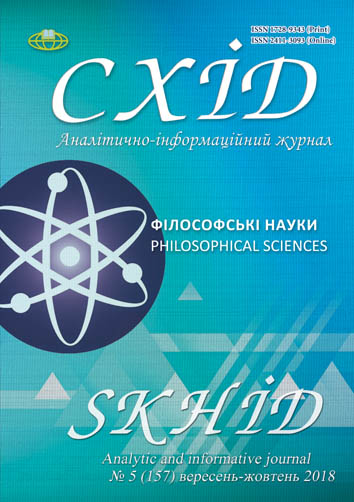Mary Wollstonecraft - first philosopher of feminism
DOI:
https://doi.org/10.21847/1728-9343.2018.5(157).148353Keywords:
vindication of women's rights, feminism, co-education, women's weakness, dependence, suffering, feeling, mind, intelligent citizenshipAbstract
Mary Wollstonecraft is sometimes called the “Mother of Feminism”. Basically, all her work is related to women's rights. In her book “A Vindication of the Rights of Woman” (1792), now considered a classic of feminist history and feminist theory, Mary Wollstonecraft argued primarily for the rights of woman to be educated. Through education would come emancipation.Downloads
References
Burke, E. 1790. Reflections on the Revolution on France. Available at: https://oll.libertyfund.org/titles/macaulay-reflections-on-the-revolution-in-france
Canuel, M. 2010. Wollstonecraft and World Improvement. Wordsworth Circle, Vol. 41, No 3, Summer. Available at: https://www.questia.com/library/journal/1G1-240729248/wollstonecraft-and-world-improvement
Cayton, Andrew. 2013. Love in the Time of Revolution: Transatlantic Literary Radicalism and Historical Change, 1793-1818, University of North Carolina Press, Omohundro Institute of Early American History and Culture, Williamsburg, Virginia, 368 pp.
Clemit, P. A. and Walker, G. L. 2001. 'William Godwin, memoirs of the author of 'A vindication of the rights of woman', Peterborough, Ontario: Broadview Press. Broadview Literary Texts.
Falco M.J. [Ed.] 1996. Feminist Interpretations of Mary Wollstonecraft. Penn State Press. University Park, PA.
Ferguson, M. 1994. Colonialism and Gender from Mary Wollstonecraft to Jamaica Kincaid: East Caribbean Connections. Columbia University Press.
Johnson, C. 2002. The Cambridge Companion to Mary Wollstonecraft. Cambridge University Press, New York.
Kaplan, C. 1985. Pandora’s Box: Subjectivity, Class and Sexuality in Socialist Feminist Criticism. In: Green, G. (Ed.), Kahn, C. (Ed.). (1985). Making a Difference. Routledge. London, 288 p.
Kelly, G. 1992. Revolutionary Feminism: The Mind and Career of Mary Wollstonecraft. St. Martin’s, New York.
Myers, M. 1990. Sensibility and the “Walk of Reason”: Mary Wollstonecraft’s Literary Reviews as Cultural Critique. Dickinson University Press, Rutherford.
O'Neill, W. 2014. The Women's Movement: Feminism in the United States and England. Routlege Library Editions: Women’s History. DOI: https://doi.org/10.4324/9780203102817
Poovey, M. 1984. The Proper Lady and the Woman Writer: Ideology as Style in the Works of Mary Wollstonecraft, Mary Shelly and Jane Austin. University of Chicago Press. Chicago.
Rousseau, J.-J. 1762. Emile, or On Education. Available at: https://oll.libertyfund.org/titles/rousseau-emile-or-education
Sapiro, V. 1992. A Vindication of Political Virtue: The Political Theory of Mary Wollstonecraft. University of Chicago Press. Chicago.
Steinbach, S. 2005. Women in England 1760-1914: A Social History. Orion Publishing Co, London, 352 p.
Taylor, B. 2003. Mary Wollstonecraft and the Feminist Imagination. Cambridge: Cambridge University Press, 331 р.
The Guardian. 2015, October. The Original Suffragette: the Extraordinary Mary Wollstonecraft by Bee Rowlatt. The Women’s Blog, Available at: https://www.theguardian.com/lifeandstyle/womens-blog/2015/oct/05/original-suffragette-mary-wollstonecraft
Todd, J. 2000. Mary Wollstonecraft: A Revolutionary Life. Columbia University Press. 538 p.
Tomalin, C. 1992. The Life and Death of Mary Wollstonecraft. Penguin, New York.
Wollstonecraft, M. 1795. An Historical and Moral View of the French Revolution; and the Effect It Has produced in Europe. Joseph Johnson, London. 226 p. Available at: https://oll.libertyfund.org/titles/wollstonecraft-an-historical-and-moral-view-of-the-origin-and-progress-of-the-french-revolution
Wollstonecraft, M. 1787. Thoughts on the Education of Daughters: With Reflections on Female Conduct, in the More Important Duties of Life. Joseph Johnson. London, 160 pp. Available at: https://archive.org/details/thoughtsoneduca00unkngoog/page/n5
Wollstonecraft, M. 1788. Mary: A Fiction. Joseph Johnson, London. Available at: https://archive.org/details/mary_1405_librivox/mary_00_wollstonecraft_128kb.mp3
Wollstonecraft, M. 1790. A Vindication of the Rights of Men, in a Letter to the Right Honourable Edmund Burke. London: Joseph Johnson. Available at: Online Library of Liberty. A collection of scholarly works about individual liberty and free markets. URL: https://oll.libertyfund.org/titles/wollstonecraft-a-vindication-of-the-rights-of-men
Wollstonecraft, M. 1796. Letters Written during a Short Residence in Sweden, Norway and Denmark. Joseph Johnson, London. Available at: http://www.gutenberg.org/ebooks/3529
Wollstonecraft, M. 1796. Original Stories from Real Life: With Conversation Calculated to Regulate the Affections and Form the Mind to Truth and Goodness. Joseph Johnson, London, 178 pp. Available at: https://archive.org/details/originalstories00wollgoog/page/n13
Wollstonecraft, M. and Janet Todd [Ed.]. 2003. The Letters of Mary Wollstonecraft. Columbia University Press, New York. 2003.
Wollstonecraft, M. and Jonathan Bennett [ed.]. 2017. A Vindication of the Rights of Woman with Strictures on Moral and Political Subjects. Available at: https://www.earlymoderntexts.com/assets/pdfs/wollstonecraft1792.pdf.
Downloads
Published
How to Cite
Issue
Section
License
Copyright (c) 2018 Larisa Menig

This work is licensed under a Creative Commons Attribution-NonCommercial-NoDerivatives 4.0 International License.
1. Authors bear responsibility for the accuracy of facts, quotations, numbers and names used.
2. Manuscripts are not sent back.
3. The publisher does not always agree with the authors' opinion.
4. The authors reserve the right to authorship of the work and pass the first publication right of this work to the journal under the terms of a Creative Commons Attribution-NonCommercial-NoDerivatives 4.0 International License. This license allows others to distribute (copy) the published work for non-commercial purposes, provided there is mandatory attribution to its authors and a link to the first publication in our journal.
5. The authors have the right to conclude separate supplement agreements that relate to non-exclusive work distribution in the form in which it has been published by the journal (for example, to upload the work to the online storage of the journal or publish it as part of a monograph), provided that the reference to the first publication of the work in this journal is included.

